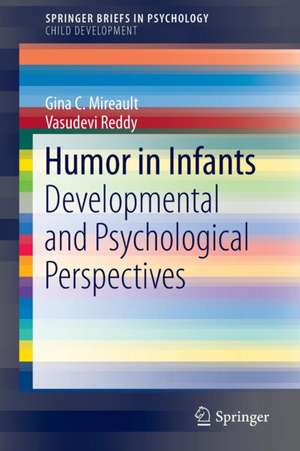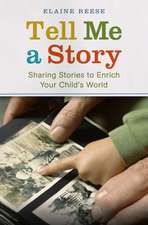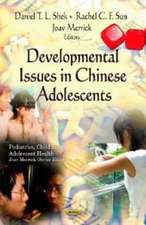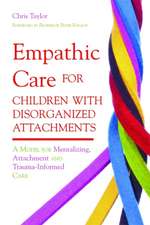Humor in Infants: Developmental and Psychological Perspectives: SpringerBriefs in Psychology
Autor Gina C. Mireault, Vasudevi Reddyen Limba Engleză Paperback – 22 iun 2016
This volume explores in depth how infants—perhaps as young as three months—develop the capacity to appreciate, participate in, and create humor. Engagingly written, it synthesizes theories of humor, its subtle complexities, and why it exists despite seeming to have little survival value. Chapters trace the developing skills in the child’s interactions with parents and others, the roles of verbal and nonverbal behaviors in humor, and related phenomena including absurdity, funniness, laughter, teasing, and play. These diverse perspectives offer rich insights into how the human mind learns from its environment, why humor is funny, and what humor can tell us about being human.
This singular text:
- Reviews theories and findings on humor and its critical role in social behavior.
- Analyzes the challenges of researching humor in infants and young children.
- Differentiates among concepts and contexts of humor and playfulness.
- Situates humor as a social-emotional as well as cognitive experience.
- Details current research on humor in atypically developing children.
- Examines the role of culture in humor.
Humor in Infants is an essential resource for researchers, clinicians, and graduate students in developmental psychology, infant mental health, social psychology, cognitive science, and pediatrics.
Din seria SpringerBriefs in Psychology
-
 Preț: 345.89 lei
Preț: 345.89 lei - 17%
 Preț: 359.88 lei
Preț: 359.88 lei -
 Preț: 346.86 lei
Preț: 346.86 lei - 5%
 Preț: 375.88 lei
Preț: 375.88 lei -
 Preț: 479.67 lei
Preț: 479.67 lei - 5%
 Preț: 413.07 lei
Preț: 413.07 lei -
 Preț: 380.84 lei
Preț: 380.84 lei -
 Preț: 377.35 lei
Preț: 377.35 lei -
 Preț: 477.56 lei
Preț: 477.56 lei -
 Preț: 344.36 lei
Preț: 344.36 lei - 5%
 Preț: 421.92 lei
Preț: 421.92 lei -
 Preț: 479.47 lei
Preț: 479.47 lei -
 Preț: 441.85 lei
Preț: 441.85 lei -
 Preț: 478.53 lei
Preț: 478.53 lei -
 Preț: 443.97 lei
Preț: 443.97 lei -
 Preț: 376.43 lei
Preț: 376.43 lei - 5%
 Preț: 356.32 lei
Preț: 356.32 lei -
 Preț: 443.75 lei
Preț: 443.75 lei -
 Preț: 411.75 lei
Preț: 411.75 lei - 15%
 Preț: 462.51 lei
Preț: 462.51 lei -
 Preț: 412.89 lei
Preț: 412.89 lei -
 Preț: 374.46 lei
Preț: 374.46 lei -
 Preț: 377.18 lei
Preț: 377.18 lei - 15%
 Preț: 463.68 lei
Preț: 463.68 lei -
 Preț: 343.88 lei
Preț: 343.88 lei -
 Preț: 474.45 lei
Preț: 474.45 lei -
 Preț: 376.22 lei
Preț: 376.22 lei - 15%
 Preț: 461.54 lei
Preț: 461.54 lei -
 Preț: 378.34 lei
Preț: 378.34 lei - 5%
 Preț: 357.23 lei
Preț: 357.23 lei -
 Preț: 342.74 lei
Preț: 342.74 lei -
 Preț: 376.80 lei
Preț: 376.80 lei -
 Preț: 376.04 lei
Preț: 376.04 lei -
 Preț: 376.22 lei
Preț: 376.22 lei -
 Preț: 344.25 lei
Preț: 344.25 lei -
 Preț: 442.44 lei
Preț: 442.44 lei -
 Preț: 375.23 lei
Preț: 375.23 lei -
 Preț: 374.85 lei
Preț: 374.85 lei -
 Preț: 347.32 lei
Preț: 347.32 lei -
 Preț: 409.80 lei
Preț: 409.80 lei -
 Preț: 374.85 lei
Preț: 374.85 lei -
 Preț: 414.42 lei
Preț: 414.42 lei -
 Preț: 344.10 lei
Preț: 344.10 lei -
 Preț: 446.65 lei
Preț: 446.65 lei -
 Preț: 476.79 lei
Preț: 476.79 lei -
 Preț: 379.68 lei
Preț: 379.68 lei -
 Preț: 380.07 lei
Preț: 380.07 lei -
 Preț: 408.44 lei
Preț: 408.44 lei -
 Preț: 376.43 lei
Preț: 376.43 lei
Preț: 408.66 lei
Nou
Puncte Express: 613
Preț estimativ în valută:
78.21€ • 81.35$ • 64.56£
78.21€ • 81.35$ • 64.56£
Carte tipărită la comandă
Livrare economică 15-29 aprilie
Preluare comenzi: 021 569.72.76
Specificații
ISBN-13: 9783319389615
ISBN-10: 3319389610
Pagini: 60
Ilustrații: XI, 62 p.
Dimensiuni: 155 x 235 x 4 mm
Greutate: 0.12 kg
Ediția:1st ed. 2016
Editura: Springer International Publishing
Colecția Springer
Seriile SpringerBriefs in Psychology, SpringerBriefs in Child Development
Locul publicării:Cham, Switzerland
ISBN-10: 3319389610
Pagini: 60
Ilustrații: XI, 62 p.
Dimensiuni: 155 x 235 x 4 mm
Greutate: 0.12 kg
Ediția:1st ed. 2016
Editura: Springer International Publishing
Colecția Springer
Seriile SpringerBriefs in Psychology, SpringerBriefs in Child Development
Locul publicării:Cham, Switzerland
Cuprins
Chapter 1: An Overview of Humor.- Chapter 2: The Development of Humor.- Chapter 3: Playfulness.- Chapter 4: Humor as a Social-Emotional Phenomenon.- Chapter 5: When Humor Goes Missing.- Chapter 6: Humor and Culture.
Recenzii
“Gina Mireault and Vasudevei Reddy, authors of Humor in Infants: Developmental and Psychological Perspectives, have written a short book totaling only 62 pages that examines numerous aspects of cognitive and emotional development in the first year of life as they might relate to the development of humor. … offers the interested reader a nice little summary of the thinking as well as the research on the topic of humor in infancy. It is a good jumping-off point for further study.” (Ronald J. Friedman, PsycCRITIQUES, Vol. 62 (1), January, 2017)
Notă biografică
Gina Mireault, Ph.D., is a Developmental Psychologist and Professor in the Behavioral Sciences Department at Johnson State College. She studies the perception and creation of humor in infants from 3 months to 12 months of age, addressing the question: How do babies figure out what is funny? She is interested in the serious implications of humor research for understanding critical developmental milestones, such as whether or not infants are capable of a “theory of mind”, whether or not humor can contribute to attachment security with parents, and whether or not infants rely on parental emotion to interpret and regulate their own emotional response to ambiguous events. She is intrigued by young infants’ detection of absurdity and what it may indicate about their early knowledge of social behavior.
Textul de pe ultima copertă
This volume explores in depth how infants—perhaps as young as three months—develop the capacity to appreciate, participate in, and create humor. Engagingly written, it synthesizes theories of humor, its subtle complexities, and why it exists despite seeming to have little survival value. Chapters trace the developing skills in the child’s interactions with parents and others, the roles of verbal and nonverbal behaviors in humor, and related phenomena including absurdity, funniness, laughter, teasing, and play. These diverse perspectives offer rich insights into how the human mind learns from its environment, why humor is funny, and what humor can tell us about being human.
- Reviews theories and findings on humor and its critical role in social behavior.
- Analyzes the challenges of researching humor in infants and young children.
- Differentiates among concepts and contexts of humor and playfulness.
- Situates humor as a social-emotional as well as cognitive experience.
- Details current research on humor in atypically developing children.
- Examines the role of culture in humor.
Humor in Infants is an essential resource for researchers, clinicians, and graduate students in developmental psychology, infant mental health, social psychology, cognitive science, and pediatrics.
Caracteristici
Examines a cutting-edge body of research on humor perception and creation in infants Reviews theories of the function and evolutionary underpinnings of verbal and nonverbal humor Explores humor from cognitive and social-emotional perspectives Discusses various elements of humor (e.g., laughter, playfulness, teasing, and clowning) Examines humor in infants with atypical development to understand perception and experience Includes supplementary material: sn.pub/extras







